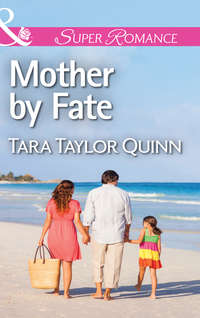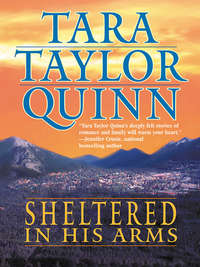
Полная версия
Somebody's Baby
“I know I promised we’d quit meeting like this.” His words fell into the not-quite-freezing Shelter Valley January night, becoming part of the air around him, floating aimlessly in space. Just as he was.
“I’m supposed to be at dinner at Will’s,” he told his wife, as he imagined her sitting across from him. “Instead, here I am again, forgoing life to sit and talk to a dead woman.”
A cold breeze wafted over the water. And his face.
“I need a drink.”
He hoped to God his neighbors couldn’t hear him over the bubbling water. Not that there was much chance anyone would be lounging around a backyard in what, for Shelter Valley, was considered a major cold front. Any time you could see your breath, it made the news.
“I’m still traveling more than you liked.” He squinted at the empty space across from him, an idiot who was weak and disappointing himself even as he gave in to the overwhelming need to connect with the woman who’d left his life more than six years before.
He wiped at a trickle of sweat making its way from his forehead down between his eyes.
“Business is good. Finished another signature Strickland design last week.”
The water was hot, but it didn’t warm the blood in his veins. Nothing was going to do that. He’d resigned himself to the truth.
He hadn’t told Meri about the capitol building dedication he’d attended in Kentucky the first week of December. Hadn’t talked to her at all over the holidays, keeping his promise to her—and to himself.
“I’m still working on my own,” he reported aloud. “I have to commission some of the menial stuff, but I’ve been able to hang tough and not give in to the pressure to commercialize the Strickland trademark.”
She’d cautioned him about that often. Said the world would be better off with fewer Strickland buildings if the ones it had were pure Strickland and not some watered-down version.
He currently had a small office in Shelter Valley with draftspeople and clerical staff, and another in Chicago. Most of his work he did out of his home.
“I have two state capitol buildings coming up in the next year. One on the East Coast, one on the West.”
She’d want the details. So, as his butt turned numb, buffeted by jets while he sat on a cement bench, John gave them to her.
His backyard was really quite something. On one side was an arboretum shaded by a couple of olive trees that he’d paid a bundle to have brought in mature. From there, desert landscaping stones led down to a brick divider and then grass lush and green enough to have been on a tournament golf course. The grass led around to the wall in the back, where flowering bougainvillea climbed randomly, covering every available inch. In front of the grass was a negative-edge pool that appeared to be fed by a waterfall from the big boulder that flanked it. Off to the right was a gazebo with wet bar and stools and a gas barbecue. He’d had them put in when he bought the house.
He’d never used them.
“I broke off my engagement.” He’d meant to tell her that right off. But he’d needed some time alone with Meri before he brought another woman between them. Even if it was only to tell her there was no other woman between them.
John took a deep breath, ducked under the water, blew out the breath and came up for air. Pushing the hair off his forehead, he blinked and sat on the other side of the spa. There was still time to get inside, take a quick shower and get over to Will’s before Becca served dinner. He could make some excuse for having missed the appetizer and drinks portion of the evening.
“I’ve tried, Meri.” The pain and hopelessness in his voice scared him. Glancing at the star-filled blackness above him, he searched, as he had countless times, for some sign that he was being heard. That there was meaning to his existence, guidance from something stronger than his weak and pathetic self. “I just don’t know how to live without you.”
Oh, he had his moments. Times when his mind was preoccupied with other things and he actually behaved like a fully functioning, relatively normal human being. But they were only moments.
“I hurt Lauren.”
But not as much as he would’ve hurt her if he’d married her and then remained committed to Meredith.
“You’d have liked her.” John had liked her.
Pressure built in his head. He was getting too hot. He’d move inside. Soon. Get himself a drink. And maybe throw a frozen dinner in the microwave. Though he was relatively skilled in the kitchen, he didn’t feel like cooking. Too much trouble for too little benefit.
“Martha Moore got married.”
She was the first woman John had dated after Meri’s death. He’d had a lot of talks with his wife about that. The day he’d met Martha. Whenever he’d passed her on the street. After the time—the only time—he’d been intimate with her.
And on the night last year, when he’d heard that the young woman who’d been raped in Shelter Valley was Martha’s nineteen-year-old daughter, Ellen.
“Shot a thirty on the back nine today. Not my best, but still under par.”
The spa, operating on an automatic timer, shut off. John got out, cooling off while he walked over to push the button again, then slid back into the dark depths, watching as his body slowly disappeared from sight. He needed a little more time before he rejoined the living.
Even if it was in name only.
He fought the urge to close his eyes and rest. He couldn’t risk picking up the inner vision where it had left off. He wasn’t going to let Meri stop breathing.
CHAPTER TWO
IT TOOK HER two and a half days to get to the Arizona border. And another five and a half hours to reach Shelter Valley. Or, at any rate, to take the turnoff for the town she couldn’t wait to see. She passed Wal-Mart. Remembered reading about the kidnapping and subsequent rape that had taken place nearby the year before.
Felt again the tug at her heart as she pictured the town ahead, almost as though these people were already part of her. She wondered if Phyllis knew the girl who’d been raped. Or if John Strickland did…
That was when Caroline yanked the car onto a deserted-looking dirt track, turned off the ten-year-old half-size pickup with its brand-new locking bed cover—under which she’d packed most of her cherished possessions and the few articles of clothing she’d thought the least offensive—and sat.
Was it legal to sit on the side of the road in a nonemergency situation in Arizona? That was something she could check as soon as she got settled someplace and was able to hook up her computer. The cobbled-together piece of equipment was buckled into the seat next to her. Next to Jesse, that machine was the most important thing in the world to her. Though she’d had different versions of it through the years as various parts grew obsolete and were replaced, either using funds saved from egg money or by begging the library to give her cast-offs, the computer had long been her very best friend. Many times, it had felt like her only friend.
But soon she was going to be dealing with more than just a screen she could manage at will. Up ahead were real people.
And at least one of them wasn’t going to be happy to see her. With a hand on her stomach, Caroline reached for her journal, a companion she referred to often and turned to the page she hadn’t read since the night she’d made the entry.
Saturday, January 1, 2005
I took the test today. It told me what I already knew….
With a finger marking the page, she closed the book. She’d written those words only a week ago. But there were more. Another entry she hadn’t dared to look back on.
She reached for the sapphire ring she’d put on a chain around her neck before leaving Grainville. It was there, hidden beneath her blouse, reminding her who she was.
She wasted a few minutes staring out over the unusual plants scattered across the desert to her right. She’d come this far. She could do this. Continue on, into town. Face whatever waited there. Begin her new life.
She deserved the chance.
Straightening her shoulders, Caroline opened the book again, flipped back several pages.
And forced herself to read.
Monday, November 22, 2004
I want to die. It would be so much more expedient to die. I went from being a child to being Randy’s wife and Jesse’s mom and now, suddenly, unexpectedly, I’m neither. Who am I, then? I ask and ask, and find there are no answers. And more frightening yet, I ask my heart who I want to be—and still can’t find answers.
I’ve been married. Given it all I had. Imagined Randy and me in our eighties on the porch swing, smiling and trying to listen through our respective hearing aids to Jesse’s grandchildren playing around the vibrant flower beds set off by a lush green yard. In this vision, the swing is treated birch, soft and supple, the porch floor solid oak. The house newly painted pristine white with forest-green shutters. And the porch rail strong enough to withstand any kind of weather.
Just like my real porch rail, my visions are chipped and faded, and any possibility of having them come true is lost forever. I will never, no matter what, grow old with Jesse’s father and, with him, watch Jesse’s grandchildren at play.
And what else do I have to offer? How can I change my future? I have no money. And no training that would allow me to make money. I can run the farm by myself for now, but even I know I won’t always be able to do that.
My heart is empty. There is no joy. No excitement or anticipation. I’ve lived my best years and
Oh, God, what am I going to do?
Tears fell on the page, bringing Caroline out of that heartache and into the present. She held her breath, the sobs threatening to break free. She wasn’t going to lose control now. She just couldn’t.
She could turn the page. Travel to Frankfort, Kentucky. To the dedication of a building that had been designed by a Shelter Valley architect, and the political gathering that had been part of the proceedings. She could read what happened next.
Instead, Caroline hid the book in her glove compartment. It would be safe there. Safe from harm. And she would be safe from it.
Starting the truck, thanking it silently for cooperating on the first turn of the key, Caroline backed so slowly she barely kicked up any dust. She clunked the old vehicle into gear and drove toward Shelter Valley.
Before she could worry about starting college at the age of almost thirty-five, or coming face-to-face with a twin sister she’d never met, before she looked for a new home, or a bed to sleep in that night, she had something else to do.
Some news to deliver.
The town came into view. A streetlight glistened. Houses dotted the side of the road, growing more dense, and she saw her first Shelter Valley citizen, an older woman, carrying a plastic grocery bag, walking a dog without a leash. Her stomach fluttered with comfort. And then panic.
She thought she might throw up. She hadn’t thrown up in years.
She watched for Mojave Street. And promised herself that whatever lay ahead, whatever his response, she could accept it.
She pulled into the driveway. Knocked on the door. Waited. Knocked again. And eventually returned to her truck. What did she do now? Every single time she’d imagined the beginning of her new life, this stop had been first—as though nothing else could happen until it was done.
It was stupid to sit there. He might not be home for days. Or maybe he’d be back in an hour.
The journal in her glove compartment drew her, as though the answer to her current dilemma lay in the revelations she’d decided to avoid.
Ignoring the impulse, she waited another half hour. Reached for the key in the ignition. And ended up at the glove compartment instead.
Wednesday, December 1, 2004
I read an article this morning and I can’t think of anything else. An architect from Shelter Valley is going to be in Frankfort this weekend to dedicate a building he designed. His name is John Strickland. I read in an old Shelter Valley newspaper last week that Will Parsons hired an architect named John Strickland to design the new classroom building at Montford University. Will’s the president of Montford. He hired Phyllis!
Oh, God, I know I’m crazy, but I have to go! This man might actually know my twin sister!
JOHN SHOT ONE HELL of a game of golf Saturday afternoon. Probably one of his best. Meredith would have teased him about his bragging. And later, she would’ve congratulated him with a kiss filled with pride—and a passion that never seemed to lose its urgency. He congratulated himself instead with a mug of beer at the bar, joining the other guys who didn’t have wives and children to hurry home to. There were three of them that afternoon. John and two men whose wives had taken their children to the zoo in Phoenix to do research on a school project involving apes.
Sometimes, as much as he loved the peace and sense of home he found in Shelter Valley, John hated the place.
Trying to concentrate on positive thoughts, he pulled his Cadillac into the driveway of his two-year-old ranch-style custom home to find someone there ahead of him. It was a testimony to the state of his mind—of his life—that the surprise visitor brought a tinge of anticipation. For the next few moments, anyway, he wasn’t going to be home alone trying to find ways to entertain himself during the remaining hours until the world once again became a workplace full of challenging issues and busy people. People demanding the kind of interaction he was capable of delivering…
A particularly telling testimony, considering the fact that the vehicle in his driveway probably belonged to the new yard guy. He’d never seen the old and rusty pickup before.
Parking to the side of the truck in the double driveway, he got out and approached just as the driver’s window was lowering.
“Can I help y—”
The last word stuck in his throat. The driver wasn’t his landscaper. It wasn’t even a guy.
The woman stepped down from her truck. She was wearing jeans, a blue turtleneck, a worn-looking thickly knitted beige cardigan and the same brown leather boots she’d had on the first time he met her. She held out a hand with freshly polished nails. “John? I don’t know if you remember me. I’m Caroline Prater.”
He remembered.
“Caroline, hi.” Fresh from the golf course, he wanted to shower and change out of the golf slacks and slightly sticky sweater he was wearing. The sun was shining as brightly as usual from clear blue skies. And although the temperature was only about sixty degrees, it had been hot out on the golf course.
“You don’t seem pleased to see me, and I don’t blame—”
“No!” He cut her off. Took her hand. It was as rough as he remembered. Working hands, she’d said. Something about that had touched him. “I’m just surprised. Kentucky’s a long way off.”
“And Shelter Valley is a very small town,” she added with a nervous smile. He remembered that about her, too. Her air of uncertainty. As though she wasn’t quite sure she was worth the space she took up but was going to occupy it anyway.
Neither of them spoke after that.
“Uh…do you want to come in?” he asked a moment later. Why was she there? Surely not to see him. He’d never given her any indication that he’d expected to see her again.
Of course, with the way she’d vanished while he’d still been sleeping off the bottle of wine he’d bought them at dinner and then drunk most of himself, she hadn’t given him a chance to actually say as much.
Though he rarely used the front entrance himself, he walked her up to the door and unlocked it.
“So what brings you to Shelter Valley?” He hoped the question wasn’t as bald as it felt scraping past his throat. She’d passed him in the hall, leaving a brief lily-of-the-valley scent in her wake. Her shampoo, if he remembered correctly.
“I’ve been accepted at Montford,” she told him with a hesitant grin. “I start school in another week.”
Oh. Well, good then. She had a reason for being here. Other than him. She’d mentioned, that night in Kentucky, that she’d already applied to college; she’d been unable to attend after high school because she’d married young. Caroline seemed to consider that a pretty big deal. He’d felt a little sorry for her over it.
“Can I get you something to drink? A beer? Or a glass of wine?” More relaxed now, John walked over to the wet bar dividing his formal living room from the dining room he’d never used.
“Do you have a diet soda?”
While she perched on the very edge of one end of the sectional couch, he grabbed a glass, filling it with ice. “You look different,” he said, smiling, deciding this might not be such a bad turn of events. Maybe she’d join him for dinner.
They could catch up like old friends, though they hardly knew each other. He could wish her luck with her new scholastic endeavor, and then, if they ever ran into each other in town, they could smile and say hi without some residual awkwardness hanging between them.
Her smile was tenuous. John poured the drink, then carried it over to her, wondering if she’d be able to unclasp the hands in her lap long enough to take hold of it.
“It’s your hair,” he said.
“I…had it shaped. And conditioned.” She took the glass. But not before he noticed how badly her hand was shaking.
He’d never met anyone like her. One minute confident enough to walk up to a total stranger at a political gathering and introduce herself, and then the next, so insecure she barely allowed herself to breathe.
“You left it long, though,” he said, returning to the bar for a can of beer. He didn’t usually drink more than one on any given day, but what the hell. He was still recovering from his vigil with Meri the other night.
“Yeah.” She took a sip. Sort of. He wasn’t sure any liquid actually passed her lips.
“I like it.”
“Thanks.”
“These days so many women keep their hair short.” Meredith had been one of them.
“It’s easier to deal with.”
That was what Meri had said.
“I like it long.”
“Thanks.”
She sipped again. John took a seat and did the same. She watched him openly—yet said nothing.
“Did you want something from me?” he finally asked.
“No!”
Well, that was clear.
“I…just…”
For the first time since she’d arrived, she wouldn’t meet his gaze. Frowning, John sat forward. He’d thought dinner would be nice, but not if it was going to get complicated. He just didn’t have what it took to deal with complicated.
Hell, based on the way he’d broken his promise to himself and run back to his memories of Meredith the other night, he didn’t have what it took to deal with living.
“Well, it was nice of you to stop by.” He hadn’t really intended the words but was relieved when he heard them. Yes, better just to end this and get on with the boring evening ahead. There were no surprises in boring.
“John, I’m pregnant.”
He sat back, the half-empty can of beer resting on his lap, loosely cupped by both hands, and looked at the bare wall opposite him. He was mistakenly caught in someone else’s life.
“Did you hear me?” The woman’s voice, though soft, seemed to grate.
“I’m sorry.” He turned to look at her. “What did you say?” The beer can was soothingly cool to the touch. He lifted it, drank. And kept drinking until it was empty.
“I said I’m pregnant.”
Uh-huh. Well. What did he do now? The beer was gone. He crushed the can between his fingers, just to confirm that.
“I, uh, I’m sorry,” he said. “I’ve never been in this position before. I don’t really know what to say.”
Mostly, he didn’t know how to make sure he didn’t feel.
“I had to tell you,” she said. “You have a right to know.”
This was a right?
“Aren’t you going to ask if it’s yours?”
His eyes met hers. Their green depths were as luminous as he remembered them. Her slim, strong, perfectly curved body was pretty impressive, but it was those eyes that had captivated him that cold December night in Kentucky. What, six weeks ago?
“I’m assuming you wouldn’t be here if it wasn’t.”
He couldn’t breathe properly. The cords in his neck tightened; his skin was hot. He wanted her out of his house. Now.
He wanted her never to have arrived. He wanted never to have met her.
“I could be lying. Or I could have done this on purpose, to trap you. I orchestrated our meeting, after all. I could’ve had a carefully thought-out plan—you know, the lonely widow trying to get out of a tiny little town that’s suffocating her.”
Some small part of him that was outside, watching the horrific scene unfold, could almost have smiled—if he hadn’t been so terrified.
“Yes.” He looked her straight in the eye. “You could have.”
“I didn’t.”
“I didn’t think you had. You aren’t the artificial type.”
She nodded, her lips tremulous as she lifted the still-full glass with a shaking hand. He hoped she didn’t spill the drink. He didn’t think he was up to standing at the moment, let alone going for paper towels.
He’d never felt so awkward in his own home. Or helpless. Lost, yes. Hopeless, yes. But not this.
There were things he should be saying. He just had no idea what they were. He sat there watching her, drawing a complete blank.
“I’m not here to ask anything from you,” she said, after excruciating seconds had turned into even more excruciating minutes.
He appreciated that. John passed the remains of the beer can back and forth between his palms. Her focus followed the movement.
“I just had to tell you.”
It was the second time she’d said that.
She stood, set the glass on the low, square wood table in front of the sectional. “I guess I’ll go, then. Thanks for seeing me.”
He was suddenly looking at her back.
“Wait!” John didn’t move. He couldn’t.
“What?” Her eyes were wide.
“Can you come back? Sit down? It seems like we should talk.”
“Okay.”
She sat.
She wasn’t a bad-looking woman. Different than he was used to. She didn’t wear makeup. And her clothes were baggy and without any discernible style. But they were clean. And she wore them with a curious and understated grace that was no less powerful for its unobtrusiveness.
“You’re pregnant.” John found himself back at the beginning.
“Yes.”
“With…my baby.” The words were so completely foreign to him that he felt stupid saying them.
“Yes.”
Her hand slid down to cradle her stomach.
Oh, God.
She had a baby in there.
His chest cramped as he tried to draw in a breath.
His baby.
He jumped up. Tripped over the table. Threw away his beer can and missed the trash bucket. Leaving the can crumpled on the hardwood floor, he pulled another from the mini refrigerator behind the bar. Popped the lid and drank.
He looked over at her. Tried to figure out his next move. What was right. And best.
All he wanted to do was run. As far as he could.
“I have to take responsibility.” The words came of their own volition, but as soon as he said them, he knew they were right.
“No, you don’t. Really. I’ll be fine. I have plans. A little money put aside. I wasn’t just talking when I said I don’t want anything from you. I really mean it.”
The sincerity in her eyes was unmistakable. An open sincerity that was all the more remarkable because of its contrast to her usually unrevealing expression.
“I’m sure you do,” he said. “But you misunderstood. I don’t have to take responsibility because of you, I have to do it because of me. The point is not negotiable. As you said earlier, I have rights.”
Her chin dropped to her chest.
“Is there another man in the picture?”
“No!” That brought her head up. She looked horrified by the very idea.
He shrugged. “You could’ve met someone between then and now.”









